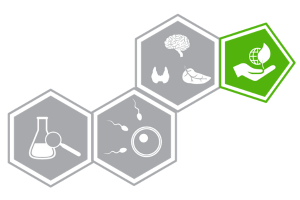
THEME 4

ENVIRONMENTAL REGULATORY STRATEGIES AND IMPLEMENTATION
Thematic Leader: Tara Barton-Maclaren
The objective of this research theme is to explore the legal consequences and the policies already in place and to come at the international level which could inspire a possible Canadian policy. Research on Environmental Regulatory and Implementation includes the development of approaches and frameworks to advance methods that may be used for screening and identification of endocrine disrupting substances by working in partnership with other research themes. The cross-cutting expertise will promote data sharing and the integration of multidisciplinary results to build on existing knowledge, determine critical information gaps and needs across the endocrine axes. Working within these partnerships will also provide opportunities to explore emerging technologies and their potential application in different regulatory contexts.
TARA BARTON-MACLAREN’S BIOGRAPHY
Dr. Tara Barton-Maclaren is currently Research Manager of the Emerging Approaches Unit in the Existing Substances Risk Assessment Bureau, Healthy Environments and Consumer Safety Branch of Health Canada. She has been contributing to human health risk assessments and methods development under Canada’s Chemicals Management Plan since 2007. The goal of the Unit is to work toward the development of approaches and strategies for the integration of emerging data and new approach methods to support prioritization and assessment of chemicals existing in the Canadian marketplace. Partnerships and collaborations are important to continue the global transition to 21st-century toxicology, with the ambition of modernizing risk assessment for the future of chemicals management in Canada and internationally. To promote alignment, she contributes to international initiatives such as the Organisation for Economic Co-operation and Development (OECD) and the Accelerating the Pace of Chemical Risk Assessment (APCRA) and participates in scientific activities with leaders nationally and internationally in the fields of computational toxicology and integrated testing and assessment strategies to support regulatory decision-making. Her interests focus on translational and applied research based on innovations in modern toxicology and building bridges for the application of new approaches in human health risk assessment for the protection of Canadians from risks posed by chemical exposures.
REGULAR MEMBERS CONTRIBUTING TO THEME 4
Toxicology of Mixtures. Chemical Carcinogenesis. Risk Assessment. Learn more
Risks Assessment. Management of Organic Chemicals. Ecotoxicology. Birds. Amphibians. Fish. Learn more
Environmental Risk Assessment. Learn more
Ecotoxicology. Assessment of the Reproductive Capacity of Fish. Learn more
Science for Policy under Uncertainty. Chemical Management. Micropollutants. Chemical Regulation. Evaluation of Potential Harm Posed by Chemicals, Chemical Pollution. Sustainable Sewage Management. Chlorine Biogeochemistry. Environment. Sustainability. Learn more
Sociology of Public Action. Environment and Environmental Health. Learn more
Ecosystem Approach to Health. Communication. Environment. Social Networks. Sustainable Health. Social and Gender Equity. Learn more
Ecotoxicology. Learn more
Aquatic Ecotoxicology. Environmental Health. Environmental Contamination. Environmental Risk Assessment. Sex and Gender in the Environment. Environmental Hypersensitivity. Environmental Education. Learn more
Environmental Health and Ecohealth Approach. Water, Environment and Health. Political Ecology. Public Policies and Scientific and Social Evaluation Systems. Agrifood Systems and Pesticides. Environmental Sciences, Major Risks and Sociology. Learn more
Biology. Water Sciences. Water Quality Criteria. Ecotoxicology. Environmental Risk Assessment. Learn more
Ecotoxicological Risk assessment, Benthic Community. Learn more
Toxicology. Reproductive Biology. Molecular Toxicology. Reproductive Health. Thyroid. Gene Expression. Environmental Toxicology. Risk Assessment. Learn more
Environmental Health. Environmental Toxicology. Overall Health. Risk Assessment. Learn more
Treatment and Sustainable Management of Contaminated Water. Learn more
Bioprocesses and the Valorization of Residues into High Value-Bioproducts. Green Chemistry to Find Ecological Alternatives to Chemical Antibiotics. Industrial Microbiology. Environmental Chemistry. Emerging Contaminants. Learn more
Analytical Chemistry. Emerging Contaminants. Water Treatment. Circular Economy. Soils. Learn more
Food Safety. Analytical Chemistry. Environmental Science. Food Science. Learn more
Risk Assessment and Risk Methodology. Learn more
Control of Environmental Contaminants. Protection of Water Resources. Water Treatment. Learn more